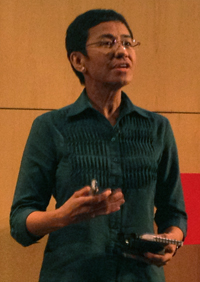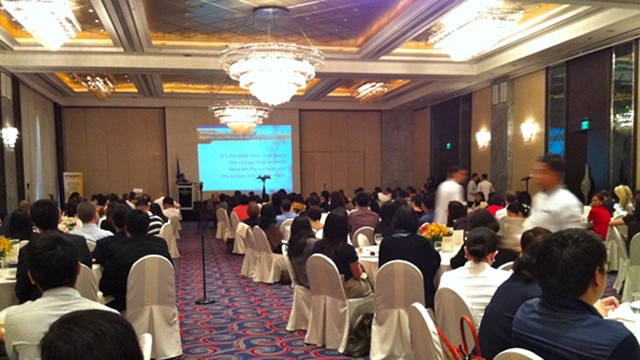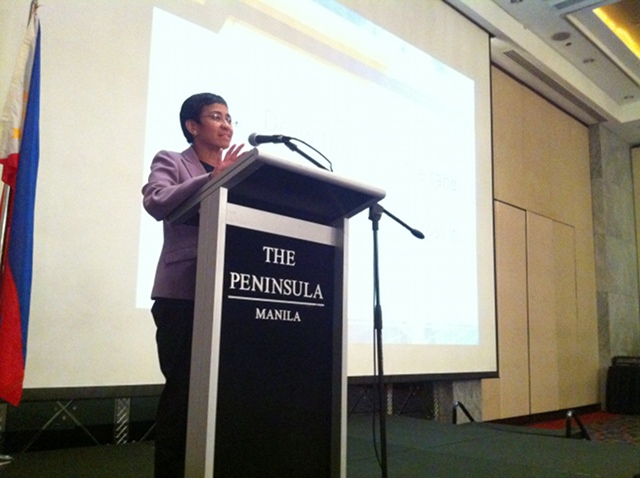SUMMARY
This is AI generated summarization, which may have errors. For context, always refer to the full article.

This was the keynote speech delivered on July 4, 2012 at the Integrity Initiative Forum co-organized by the Makati Business Club (MBC), the European Chamber of Commerce of the Philippines (ECCP), Management Association of the Philippines (MAP) and the American Chamber of Commerce of the Philippines (Amcham). Read more about the event here.
Corruption is endemic. It infiltrates so many aspects of our lives. Influence-peddling is the name of the game. Conflicts of interest are all over the place. I find many have a difficult time even defining what conflict of interest means. It’s too easy to rationalize particularly when it means more money or influence.
I’ve been a journalist now for more than a quarter century. Fighting corruption has been a constant – and enduring – factor in my career. In my 20’s, I helped start an independent production company called Probe Productions with Cheche Lazaro. I worked for all the local television stations here and reported for and ran CNN’s Southeast Asian operations for 18 years.
Now I’ve set up a company called Rappler, where we have a zero tolerance policy for corruption. I’ve come up with my own ideas and practices for how to root and stamp out corruption. You not only have to walk the talk. You also have to talk the walk – as I’m doing now. Why? Because corruption is contagious, and it isn’t the big public act that does the most damage. It’s the hundreds and thousands and hundreds of thousands of little acts we ALL commit that’s more corrosive to society. Let me explain that.
Sometimes doing the wrong thing seems to be the only way to get ahead. I’ve heard so many Filipinos say that – particularly the street-savvy operators who are trying to get you to do the wrong thing!
You have to find the courage to say no. You have to do what’s right – not just for your company, but for yourself. You have to find and set this line – a line you promise yourself you will never cross – because crossing that line means you’re turning from good to evil. It’s that simple. And you must make it that simple.
Why? Because corrupt people don’t think they’re corrupt. Just like evil people don’t think they’re evil. How do you get to become corrupt or evil? You take one small step across a line.
Once you take that first step and cross over, the succeeding steps become easier, and before you know it, you’re not just corrupt but are now corrupting others. This, for me, is like a reverse tipping point. You know the book by Malcolm Gladwell? The subtitle to the Tipping Point is How Little Things Can Make a Big Difference. The idea is that it’s the little steps that begin the change that simmers beneath the surface until the system hits critical mass, the boiling point.
When did we become endemically corrupt as a nation? The point when enough people took enough small steps to make it that way.
We have to change it. How do we do that? By understanding how we got there. It starts with each person making a choice. Draw the line in the sand. Do not cross it.
The most dangerous decision is that first one – when you move from being perfectly clean and idealistic … to being tempted … to wanting it… and then accepting it. Don’t do it. Once you do, it’s a slippery slope. Define that line and DO NOT CROSS it.
As a journalist, media corruption is a fact of life. Politicians, company officers and government officials have told me they’re flabbergasted by the number of journalists on their payrolls. I ask, “why don’t you stop paying and expose them?” They say they can’t because they’re afraid if they don’t pay, they would be attacked. It’s so prevalent the radio guys coined a term for it – “AC-DC” – Attack-Collect-Defend-Collect.
Of course, paying also works in favor of the newsmakers: if they pay, they control what’s written or said about them. They know when it will come out, and what type of exposure and PR they can get. That certainty, for them, is worth paying journalists. So the cycle feeds itself.
Young journalists say no because they’re idealistic, but after a while, they start to see the way things really work. They begin to get disillusioned. The lines begin to blur together, particularly since so many of their elders are doing it.
Then the real test comes – the offer that’s hard to refuse. Everyone gets that. If you pass that test, chances are you’ll stay clean your whole professional career. It’s a tipping point in a positive way. You’ve already said no to the hardest offer to decline – the one you wanted the most – so everything is easy. But the tipping point works the other way if you accept.
It starts with envelopes of money in press conferences. When I was with Probe, I thought, let’s make it easier for the newsmakers and publicly state our position against what we called envelopmental journalism. So we did.
Strangely, other journalists – our colleagues – were critical of us for raining on their parade. During that time, it seemed to me that the clean journalists were the ones who were ostracized and cowed into silence. They didn’t trumpet their beliefs because they were afraid others would say they’re “nagmamalinis” – even if that really was what we should be doing.
Our cultural values somehow don’t extend to making others ashamed to be corrupt. A friend explained it to me this way: “I have no right to take that money away from his kids.” I saw it happen again a few years back to a young, idealistic reporter who said no to money. He was socially ostracized and attacked by his crew.
Simple truths
There are some simple truths. The more you say no, the easier it becomes. The more you do the right thing, the harder it is to do the wrong thing. It’s a tipping point approach to building your identity.
My line in the sand was defined long ago. The tipping point happened in the mid-90’s – when the fiancée of one of my closest friends offered me $150,000 to do a story for CNN. It wouldn’t be traceable, he told me, and it would be deposited directly into my bank account. He gave the offer over lunch, and although I wanted to say no immediately, he held my hand and said, please take at least a night to sleep on it and think about it. I did.
I was shocked. I didn’t even tell my friend. That night, I thought about it. But then reality stepped in. My sense of self is tied to being a professional journalist, and I couldn’t look at myself in the mirror if I accepted the bribe.
I had drawn the line clearly, and I knew that accepting that money would make me a fundamentally different person. On this side of the line, I’m good. On the other side, I’m evil. It’s that simple.
How do I define evil? I like the definition from a book I’d encourage everyone to read: THE LUCIFER EFFECT: HOW GOOD PEOPLE TURN EVIL by Philip Zimbardo. He did the famous Stanford Prison Experiment – when he took a group of ordinary students and put them in a mock prison, randomly assigning some as guards, others as prisoners. In less than a week, he had to stop the study when the ‘guards’ became increasingly sadistic and the ‘prisoners’ pathological. He analyzes these findings in the context of what American soldiers did in Abu Ghraib and Guantanamo Bay prisons.
It shows how situations – culture if you will – can make good people do bad things because they conform, comply, obey or are seduced by the circumstances. They join the group. They justify. They rationalize.
These findings helped explain many things about Philippine society to me – endemic corruption and election violence, particularly heinous crimes like the Maguindanao massacre.
Zimbardo gives evil a psychologically based definition: “Evil consists in intentionally behaving in ways that harm, abuse, demean, dehumanize, or destroy innocent others – or using one’s authority and systemic power to encourage or permit others to do so on your behalf.”
Notice this definition has two parts, and the second part is as important as the first part because it means that you can’t turn away and pretend you don’t see evil done when you have the ability to stop it. It’s a culture we need to create.
How do you do that? Let me jump a little here because it reminds me of the Princeton Honor Code, which each Princetonian writes on every single term paper, every single exam: one single sentence that says you have not cheated and – this is important – you promise to turn in anyone who does.
Teachers leave the students alone in a room, hand out test papers, and put them on their honor. It’s brilliant in part because it uses peer pressure. Even if you tried to cheat, can you be sure everyone in the room will cheat with you by not turning you in? Even worse, are you willing to compromise not just your honor but everyone else’s? You’re part of a tradition that dates back hundreds of years, and you can’t let the institution, your friends, and your family down. It was always with a sense of pride and great honor that I signed that pledge.
Zero tolerance
When I was head of news of a major network for 6 years, I tried to create that culture – to use peer pressure to redefine up rather than down – to live according to our ideals. So I helped write a Standards & Ethics Manual.
I imposed a zero tolerance approach to corruption. No matter who you are, if you accept a bribe, you will lose your job. Instead of accepting offers, our people started reporting them. We proved peer pressure can also work in a good way!
I discovered a lot more than I bargained for. One employee reported an offer for about P12 million for a series of stories on one issue. It uncovered a systematic attempt to influence policy through news reports. This is not unique to the news group I headed. Once you become aware, you start to pick up these stories from different news outlets.
Elections were another matter. In November 2009 – months before the May 2010 elections, several people at our desk reported political candidates who offered sizeable monthly atm deposits in exchange for stories. We met with the candidates who made those offers and told them that if they didn’t stop, we would do stories about their bribery attempts. We would start a series called corruption watch. I told them they didn’t need to pay for stories.
Several of the candidates candidly said you know if we didn’t do this, other journalists would be upset and write against us. “We’re only protecting ourselves,” they said. One talked about having to run a covert media campaign and asked for help finding someone who could run black ops. We gave them a grace period to stop and said we would run stories exposing these practices.
So let’s go back to Zimbardo’s definition of evil. He summarized all of this in one sentence: he said evil is “knowing better but doing worse.”
A new book published last month validates a lot of what I’ve told you and puts it in scientific terms. It’s a study about cheating, which is the root of corruption. The title is THE (HONEST) TRUTH ABOUT DISHONESTY by Dan Ariely, a professor of psychology and behavioral economics at Duke University. He says, “everybody has the capacity to be dishonest and almost everybody cheats – by just a little. Except for a few outliers at the top and bottom, the behavior of almost everyone is driven by two opposing motives: the first is we want to benefit from cheating and get as much money and glory as possible; the second is we want to view ourselves as honest, honorable people.”
Cheaters don’t think they’re cheaters. Corrupt people don’t think they’re corrupt. Evil people don’t think they’re evil.
He and his researchers discovered that cheating is not affected or curbed by the probability of getting caught. Through a series of experiments, they listed several conditions which actually made people cheat more. Believe it or not, wearing fake designer labels increases cheating. Being drained emotionally or mentally makes you more prone to cheat. And if you think it will benefit your group, you’ll cheat. It’s the Robin Hood syndrome. More importantly, cheating is contagious: people openly cheating increase incidents of cheating around them.
How do you stop or curb cheating? The Princeton Honor Code and the Integrity Pldege are on the right track. Researchers showed that ethics lectures and training seem to have little to no effect on people, but reminders of morality right at the decision point have a huge impact on behavior. An honor code, a code of ethics, the Bible – these help stop cheating.
Ariely’s findings validate the life lessons I’ve told you about.
I’ll leave you with one last study done by two Harvard professors. It’s called the Three Degrees of Influence Rule. It says that everything we say or do ripples through our social networks, affecting our friends (first degree), our friends’ friends (second degree) and our friends’ friends’ friends (third degree). If I’m feeling lonely, my friend has a 54% chance of feeling lonely, my friends’ friends have a 25% chance of feeling lonely because I do, and my friends’ friends’ friends have a 15% chance of feeling lonely because I do. They were able to map the spread of emotions like loneliness & happiness; studied complex behaviors like political views and voting behavior; sexual behavior and disease contagion; smoking; drinking and even gaining weight. Obesity spreads through social networks.
Look at how obesity spreads through social networks. If you look at the statistics, it follows the paradigms of social network theory. This is how corruption spreads.
Now when I hear statements like this, I know it’s a red alert. “Everyone is doing it.” “I’d be stupid if I didn’t take it.” “The budget is there anyway.” I like this one -“I don’t have to do what they want anyway.” I’ve heard these excuses from journalists who accept bribes – and encourage others to do the same. It’s like a virus that spreads.
These ideas of social network theory, by the way, are the same ideas behind Rappler – which looks at the ways emotions and ideas spread through social networks. It’s the reason why I’m speaking to you today. That, together, we can begin to counteract this virus and spread our own anti-corruption agenda.
Corruption cuts across our industries. This is a challenge for all of us. You know your reality better than I do. You have your business targets. You have your personal ambitions. So the question only you can answer is – what are you willing to do to get what you want? Where do you draw the line you will never cross? Where on this side you’re good, on the other, you’re evil?
How do you define your own individual battle for integrity?
Let me end with four ideas that have helped me find the courage to do what’s right:
- Be excellent at what you do. Work hard. Everything begins there.
- Be self-aware. Ask yourself the tough questions and give honest answers. Be aware of how your actions affect others.
- Take responsibility for what you say and what you do. Will you act this way if everyone can see what you’re doing? Statements like “only following orders” or “everyone else is doing it” abdicates responsibility. Remember, how you behave is completely under your control.
- Find your allies. Once you find the courage to say no and take responsibility for your actions, you reverse the tipping point for evil and begin to tilt the balance the other way. Fight the group that will drag you down. Find the group that will raise you up. You’ll need help.
I wish you stamina and much courage for the battles ahead. If each of you decides to draw the line, you make a choice for good. It will make a difference for you, your family and your company. But it goes further – and gets much bigger – than that. When you put all our efforts together, we can push the tipping point for our nation. – Rappler.com
Learn more about the Integrity Initiative. Join more than 1,000 companies in the Philippines and sign the Integrity Pledge.
Add a comment
How does this make you feel?


There are no comments yet. Add your comment to start the conversation.